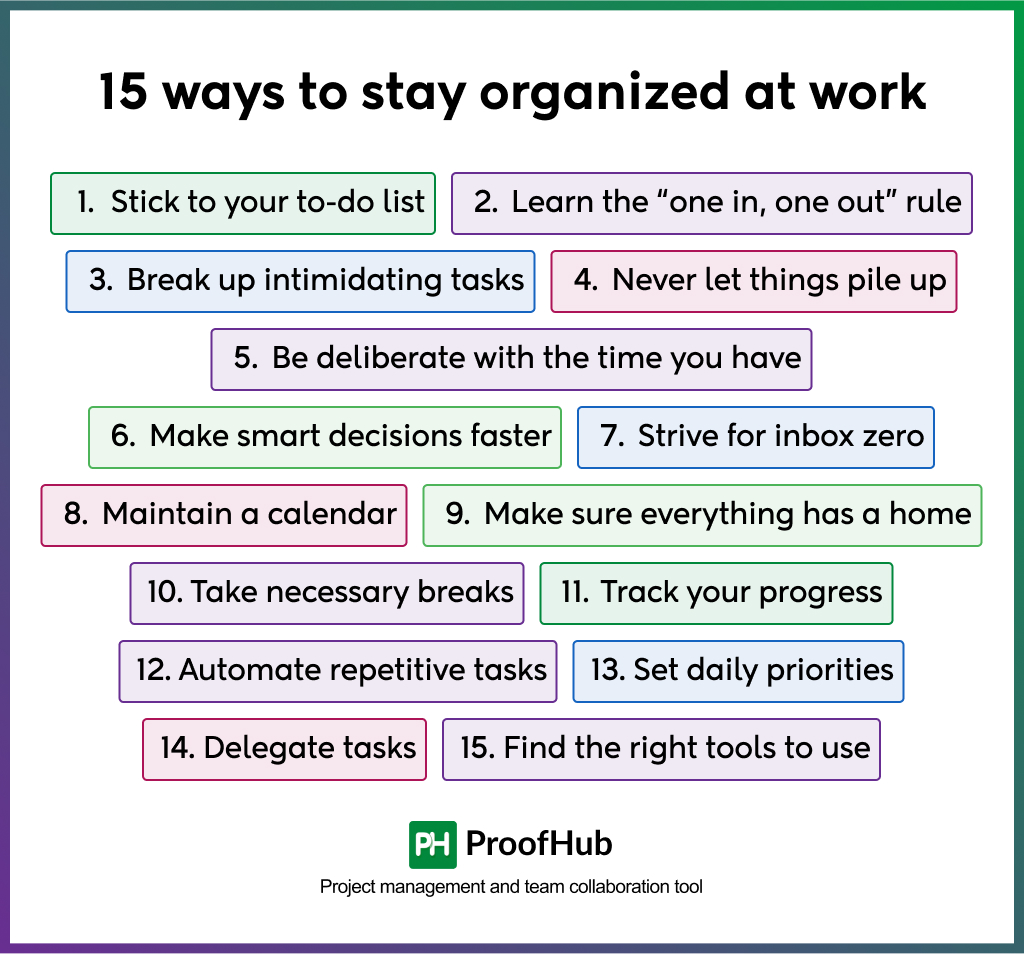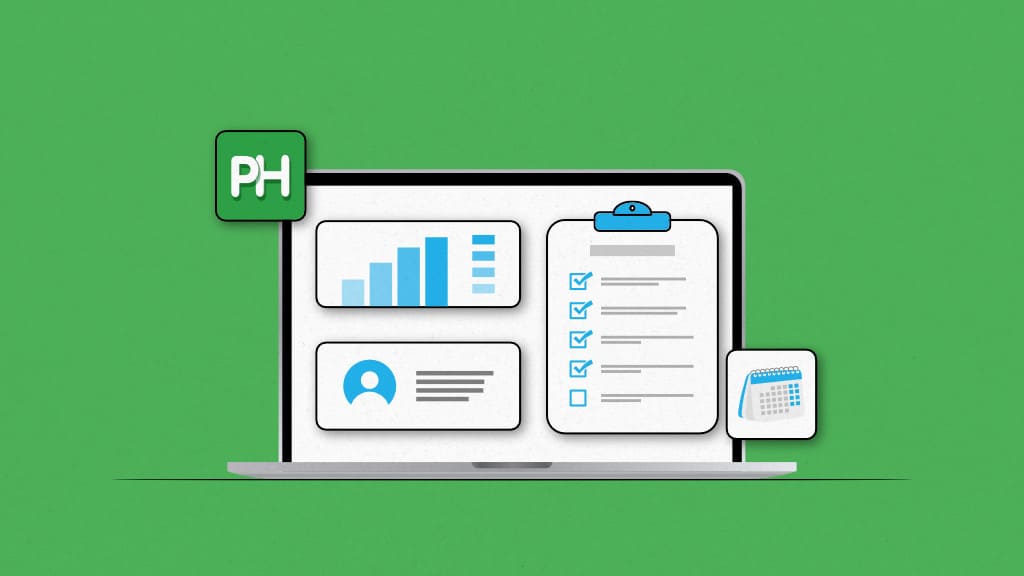Understanding how to stay organized can help you manage the workload, meet deadlines, and enhance productivity. Apart from these benefits, it helps you to take control of your time and improve your focus on essential tasks.
It boosts productivity, reduces stress, and improves overall job satisfaction. In fact, a study by the National Association of Professional Organizers found that disorganization can lead employees to lose up to one hour per day searching for lost items or information!
Know the importance, and best ways to stay organized at work. They can be beneficial for you and improve your overall growth as a professional.
Why is it important to stay organized at work?
Staying organized in the workplace is important to increase productivity and efficiency. Here are the benefits of staying organized at work:
- Improved work quality: Disorganization leads to missed deadlines and last-minute chaos. On the other hand, staying organized at work improves work quality due to a structured work approach and high-quality output.
- Reduces stress: A cluttered workspace and messy schedules give you extra stress. Staying organized reduces stress and gives you complete control because you have a plan for managing tasks.
- Improves collaboration: When working in a team, organized communication prevents misunderstanding and leads to improved collaboration. Well-organized email threads and project plans help in smoother teamwork and better results.
- Increase productivity: A structured approach and clear schedules minimize distraction, which ultimately helps you complete tasks more efficiently.
- Enhances time management: Staying organized at work allows you to allocate time efficiently, which ensures that tasks are completed on time.
Top 15 ways to stay organized at work:

1. Stick to your to-do list
Never overestimate the number of tasks you can get done in a day. Instead of adding too many things to your list and feeling frustrated when you can’t finish it – try an online to-do list app, create your to-do list for the day, and most importantly, stick to it.
2. Learn the “one in, one out” rule
One in, one out rule is a method that is used to control the number of things in one place or at one specific time. The rule can easily be applied to your to-do list. It simply implies that for every new task you are planning to add to your list, you must complete one task first. It’s a simple trick that works quite well to help you declutter your daily routine and reduce stress.
3. Break up intimidating tasks
We all have spent our share of time with projects that are too complicated to be completed on time. Breaking such overly complicated projects into smaller, manageable tasks and subtasks during the project planning stage is one of the best ways to deal with such a situation. When overwhelming work becomes something smaller you can focus on, it is much easier to keep your mind focused and get it done quickly.
4. Never let things pile up
As you’re thinking about all the things you need to get done, there is a chance that you may end up piling things on your plate instead of getting them completed one by one. This is basically how most people waste time at work. But it doesn’t have to be that way for you. Just recognize the urgency of each task and activity at hand, set clear goals, and above all, stay productive throughout your day.
5. Be deliberate with the time you have
Effective time management plays a crucial role in keeping things in their proper place when you’re super busy. Productive people know the importance of time management and act smart about how they spend their time across all the assigned tasks and activities. You’ve got 24 hours in a day, make sure that you’re doing what matters to you the most.
6. Make smart decisions faster
If you want to finish what you have started, speed up your decision-making process. Quit the habit of procrastinating at work. The longer you wait to do something, the more difficult it will be to get it done. If you want your work life to be less stressful and more productive, then keep yourself up-to-date and do what needs to be done as soon as possible.
7. Strive for inbox zero
To prevent yourself from facing a super busy day at work, you’ve got to practice the habit of removing things that you need. For example, unnecessary email threads. emails may have been a productive business tool in the past but today they’re just getting you down.
Opening every email that pops up in your inbox, taking time out from your work schedule to check your inbox twice a day, or replying to unnecessary email threads – dealing with emails is not much fun, right? Then why don’t you keep its usage to a minimum throughout the day?
8. Maintain a calendar
Most people are afraid to use calendars, but how about online calendars? Since we are living in a world of technological advancements and automation, using a cloud-based calendaring application is a choice that makes complete sense.
Fortunately, there are plenty of powerful tools and apps available in the business world that simplify the way you manage your projects, tasks, meetings, events, and almost everything else that you need to manage to make your day successful at work. Figure out the kind of tool that will work best for you and your team and make sure you include it in your daily work routine immediately.
9. Make sure everything has a home
When you get super busy at work and have clashing deadlines, keeping things in place is certainly the last thing on your mind. But if everything around you is in its proper place, there’d be no reason for you to put them back into their place.
Just think about this – if you’re not going to keep your desk organized, would you be able to find what you need without wasting any time? The answer is no. So, make sure that you treat your workspace well and that everything on your desk has a proper home.
10. Take necessary breaks
Sitting in front of the screens and working for long hours continuously will not only harm your eyes but also build stress. You can take short breaks after regular intervals of time, which will help your eyes and reduce mental stress. Also, taking short breaks will enhance your productivity and minimize errors as you return to work with a fresh mind.
11. Track your progress
While you keep track of your tasks regularly, it will help you to stay on top of your tasks, deadlines, and goals. Monitoring tasks will help you focus on work as you have a better idea of what work needs your urgent attention.
12. Automate repetitive tasks
There are many tasks that you have to repeat, either daily, weekly, or monthly. You need to automate these repetitive tasks to manage your time appropriately. By automating repetitive tasks, you need not bother about starting them from scratch and wasting your time. It will increase your productivity and help you to focus on the urgent tasks.
13. Set daily priorities
Prioritizing important work in the workplace is essential to ensure that important tasks are completed efficiently and on time. It also helps in organizing tasks in a better way, as you have an idea about the urgency of the tasks and can allocate time effectively to prevent last-minute hassles. Setting daily priorities reduces procrastination because you have a clear plan of what needs to be done and by what time.
14. Delegate tasks
When you have too many tasks with you or a particular task is beyond your expertise, delegating tasks to your team members can help. You can use the Eisenhower Matrix to set the urgency of the tasks so that team members can handle the tasks according to priority. Delegating tasks improves team collaboration and promotes a structured workflow, which makes it easy to track tasks and projects.
15. Find the right tools to use
A key aspect of creating a productive routine is having the right kind of tools at your disposal. Whether it’s a project management tool, a project planning software, a time tracking tool, or a file-sharing software solution, you must have the right kind of tool to do your job the right way. Plus, be sure to keep yourself updated about all the latest trends and tools so you can use the best ones to get your work done.
What tools & apps can help stay organized at work?
To stay organized at work, whether you’re working as an individual or part of a team, the right tools can make a huge difference. ProofHub is an excellent all-in-one project management and collaboration tool designed for teams managing multiple projects. It helps organize tasks, files, discussions, and deadlines in one centralized platform.
For individuals looking to manage daily to-dos and priorities, Todoist is a simple yet powerful task manager that helps break down work into manageable actions, set deadlines, and track progress.
If your teams relies heavily on documents, you can benefit from Google Workspace, specifically Google Docs, Sheets, and Calendar. Evernote is a great tool for individuals who want to capture ideas, clip web content, and organize personal notes across devices.
“Need a tool for project management and collaboration? Try ProofHub for free to manage all your tasks, events and milestones at one place.”
Frequently asked questions
What 5 activities are involved in organizing?
Sorting, prioritizing, scheduling, assigning, and reviewing tasks are the five activities you need to focus on to stay organized.
How to prioritize tasks when everything feels urgent?
Create a list of your tasks and understand the difference between urgent and important. Use the Eisenhower Matrix method to find the urgency and delegate tasks that are important but of low urgency.
What are common pitfalls to avoid when trying to stay organized?
Working on too many tasks at the same time, not prioritizing urgent tasks, working without a clear plan, failing to manage distractions, and delaying decision-making are some common pitfalls you should avoid to stay organized at work.

